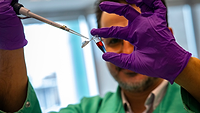USDA Scientists Working on Method to Give Hens Ability to Pass on Salmonella Immunity to Chicks

Image credit: Myriams Fotos via Pexels
Scientists from the U.S. Department of Agriculture’s Agricultural Research Service (USDA’s ARS) are making progress in their efforts to give hens the ability to pass some Salmonella immunity along to their broiler chicks—an approach the researchers are calling “transgenerational protection.” The work is being conducted by the ARS Food and Feed Safety Research unit, which focuses on preharvest food safety interventions to reduce the microbial load in live chicken, before entering the processing plant.
The scientists are exploring whether it is possible to naturally enhance the immune response of broiler breeder hens to Salmonella, and if an improved immunity to Salmonella would be transferred to the hens’ offspring.
To boost hens’ immunity, the researchers first investigated the impact of antibiotic alternatives, like natural botanicals or other biofactors, used as feed additives. When the scientists tested chicks of hens that were given supplemented feed, the team found that, in comparison to the chicks of hens that were given no supplementation, the chicks that were hatched from the eggs of hens fed a supplemented diet showed greater resistance to Salmonella. The scientists were able to determine the chicks’ levels of resistance to Salmonella by testing the chicks’ cytokine and chemokine responses, which relates to Salmonella colonization.
Reducing early colonization of broiler chicks by Salmonella may translate to fewer foodborne pathogen-causing bacteria that enter the food chain through contamination at the processing plant, thereby ultimately reducing the risk to the consumer.
Looking for a reprint of this article?
From high-res PDFs to custom plaques, order your copy today!






